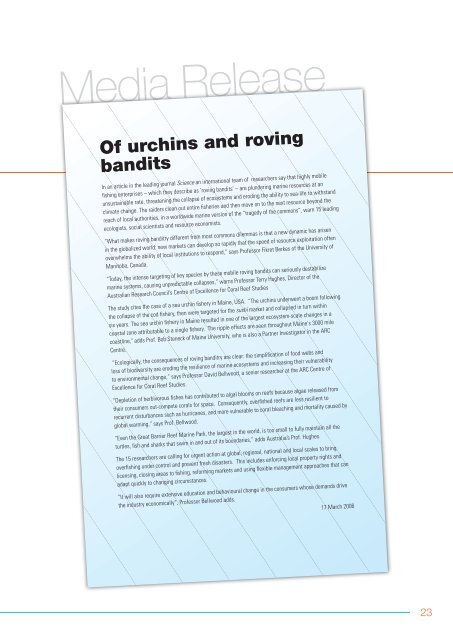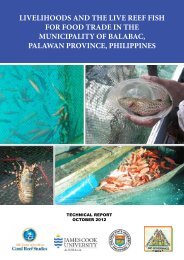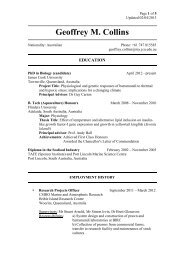Download - ARC Centre of Excellence for Coral Reef Studies
Download - ARC Centre of Excellence for Coral Reef Studies
Download - ARC Centre of Excellence for Coral Reef Studies
Create successful ePaper yourself
Turn your PDF publications into a flip-book with our unique Google optimized e-Paper software.
Media ReleaseOf urchins and rovingbanditsIn an article in the leading journal Science an international team <strong>of</strong> researchers say that highly mobilefi shing enterprises – which they describe as ‘roving bandits’ – are plundering marine resources at anunsustainable rate, threatening the collapse <strong>of</strong> ecosystems and eroding the ability to sea-life to withstandclimate change. The raiders clean out entire fisheries and then move on to the next resource beyond thereach <strong>of</strong> local authorities, in a worldwide marine version <strong>of</strong> the “tragedy <strong>of</strong> the commons”, warn 15 leadingecologists, social scientists and resource economists.“What makes roving banditry different from most commons dilemmas is that a new dynamic has arisenin the globalized world: new markets can develop so rapidly that the speed <strong>of</strong> resource exploitation <strong>of</strong>tenoverwhelms the ability <strong>of</strong> local institutions to respond,” says Pr<strong>of</strong>essor Fikret Berkes <strong>of</strong> the University <strong>of</strong>Manitoba, Canada.“Today, the intense targeting <strong>of</strong> key species by these mobile roving bandits can seriously destabilizemarine systems, causing unpredictable collapses,” warns Pr<strong>of</strong>essor Terry Hughes, Director <strong>of</strong> theAustralian Research Council’s <strong>Centre</strong> <strong>of</strong> <strong>Excellence</strong> <strong>for</strong> <strong>Coral</strong> <strong>Reef</strong> <strong>Studies</strong>The study cites the case <strong>of</strong> a sea urchin fishery in Maine, USA. “The urchins underwent a boom followingthe collapse <strong>of</strong> the cod fishery, then were targeted <strong>for</strong> the sushi market and collapsed in turn withinsix years. The sea urchin fi shery in Maine resulted in one <strong>of</strong> the largest ecosystem-scale changes in acoastal zone attributable to a single fishery. The ripple effects are seen throughout Maine's 3000 milecoastline," adds Pr<strong>of</strong>. Bob Steneck <strong>of</strong> Maine University, who is also a Partner Investigator in the <strong>ARC</strong><strong>Centre</strong>.“Ecologically, the consequences <strong>of</strong> roving banditry are clear: the simplification <strong>of</strong> food webs andloss <strong>of</strong> biodiversity are eroding the resilience <strong>of</strong> marine ecosystems and increasing their vulnerabilityto environmental change,” says Pr<strong>of</strong>essor David Bellwood, a senior researcher at the <strong>ARC</strong> <strong>Centre</strong> <strong>of</strong><strong>Excellence</strong> <strong>for</strong> <strong>Coral</strong> <strong>Reef</strong> <strong>Studies</strong>.“Depletion <strong>of</strong> herbivorous fishes has contributed to algal blooms on reefs because algae released fromtheir consumers out-compete corals <strong>for</strong> space. Consequently, overfi shed reefs are less resilient torecurrent disturbances such as hurricanes, and more vulnerable to coral bleaching and mortality caused byglobal warming,” says Pr<strong>of</strong>. Bellwood.“Even the Great Barrier <strong>Reef</strong> Marine Park, the largest in the world, is too small to fully maintain all theturtles, fish and sharks that swim in and out <strong>of</strong> its boundaries,” adds Australia’s Pr<strong>of</strong>. Hughes.The 15 researchers are calling <strong>for</strong> urgent action at global, regional, national and local scales to bringoverfi shing under control and prevent fresh disasters. This includes en<strong>for</strong>cing local property rights andlicensing, closing areas to fishing, re<strong>for</strong>ming markets and using fl exible management approaches that canadapt quickly to changing circumstances.“It will also require extensive education and behavioural change in the consumers whose demands drivethe industry economically”, Pr<strong>of</strong>essor Bellwood adds.17 March 200623
















